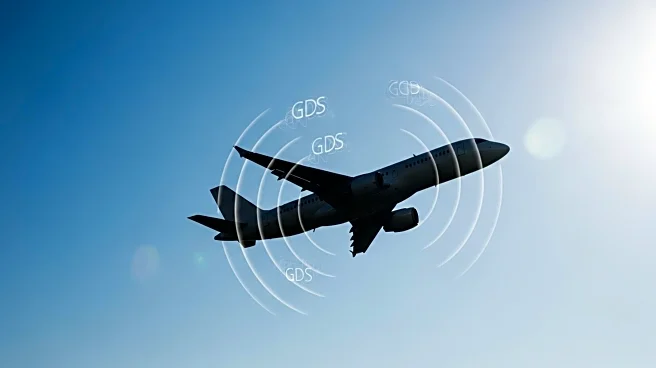What's Happening?
Russia is suspected of jamming the satellite signal of a plane carrying Ursula von der Leyen, the European Commission President, over Bulgaria. This interference reportedly forced the plane to circle an airport for an hour. The incident occurred as von der Leyen was traveling to Plovdiv, Bulgaria, when her charter plane lost satellite navigation aids. The European Commission's deputy spokesperson, Arianna Podestà, confirmed the incident, attributing it to potential Russian interference. This type of interference has become more common in airspace near Russia, although it remains unclear if von der Leyen was specifically targeted. The incident was first reported by the Financial Times, which noted that the plane circled Plovdiv airport for an hour. This event took place during von der Leyen's four-day trip to seven EU member states on the bloc's eastern border.
Why It's Important?
The suspected jamming incident underscores the ongoing tensions between Russia and the European Union, particularly in the context of airspace security. Such interference poses significant risks to aviation safety and highlights the broader geopolitical challenges in the region. The incident also reflects the increasing use of electronic warfare tactics, such as GPS jamming and spoofing, which have escalated since Russia's full-scale invasion of Ukraine in 2022. This development could lead to heightened security measures and further strain relations between Russia and the EU. The European Commission has already imposed sanctions on companies involved in GPS signal disruption, indicating a firm stance against such actions. The broader implications include potential disruptions to air and sea travel, as well as increased military and hybrid threats in the region.
What's Next?
In response to the incident, the European Commission is developing an aviation-specific plan and broader strategies to prevent GPS jamming. This may involve increased collaboration with EU member states to enhance defense capabilities and support for Ukraine. The situation could also prompt further diplomatic discussions and potential sanctions against Russia if the interference is confirmed. Additionally, the incident may lead to increased scrutiny of airspace security measures across Europe, particularly in regions close to Russia. The ongoing geopolitical tensions suggest that similar incidents could occur in the future, necessitating proactive measures to safeguard aviation safety.
Beyond the Headlines
The incident raises ethical and legal questions about the use of electronic warfare tactics in civilian contexts. It highlights the vulnerability of global satellite navigation systems and the potential for such tactics to be used as tools of intimidation or coercion. The broader cultural implications include the need for increased public awareness of the risks associated with electronic interference and the importance of international cooperation to address these challenges. The incident also underscores the need for robust legal frameworks to hold accountable those responsible for such actions.









